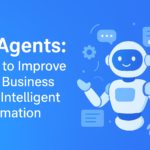In today’s rapidly evolving digital economy, businesses are constantly looking for smarter, faster, and more efficient ways to operate. Automation has long been a cornerstone of efficiency, but with the rise of AI agents, we are witnessing the next generation of intelligent business transformation. Unlike traditional automation tools, AI agents are dynamic, adaptive, and capable of reasoning, learning, and acting autonomously. They are not just following predefined scripts—they’re thinking, analyzing, and making decisions that help businesses operate at scale.
This article explores how AI agents are reshaping industries, the practical benefits they bring, and how your business can leverage intelligent automation to unlock new growth opportunities.
What Are AI Agents?
AI agents are software programs powered by artificial intelligence that perceive their environment, process data, and take action to achieve specific goals. Unlike simple chatbots or rule-based automation, AI agents use advanced techniques like natural language processing (NLP), machine learning (ML), and reinforcement learning to adapt and improve their performance over time.
These intelligent agents can operate independently or collaborate with humans, making them ideal for tasks such as:
-
Customer support automation
-
Business process optimization
-
Sales and marketing personalization
-
Data analysis and decision-making
-
Workflow orchestration across multiple platforms
By integrating AI agents into your operations, you can extend automation beyond repetitive tasks, allowing your business to become smarter and more proactive.
Why Businesses Need Intelligent Automation
The digital-first marketplace demands speed, accuracy, and agility. Manual processes or outdated automation systems often create bottlenecks that hinder growth. Intelligent automation, powered by AI agents, addresses these challenges by combining automation with intelligence.
Here’s why businesses need AI-powered intelligent automation:
-
Scalability – AI agents can manage thousands of interactions simultaneously, ensuring businesses handle growth without scaling workforce costs.
-
24/7 Availability – Customers expect real-time service, and AI agents provide uninterrupted assistance across time zones.
-
Cost Reduction – By automating repetitive tasks, companies save resources and redirect human talent to high-value projects.
-
Personalization – AI agents adapt to user behavior, delivering tailored recommendations and improving engagement.
-
Data-Driven Insights – These systems continuously analyze large datasets, uncovering patterns and actionable intelligence for better decision-making.
Practical Use Cases of AI Agents in Business
AI agents are versatile and can be applied across industries. Below are some of the most impactful use cases where businesses are seeing measurable improvements:
1. Customer Support and Engagement
AI-powered customer service agents handle inquiries, complaints, and troubleshooting without requiring human intervention. They provide quick, accurate responses while learning from interactions to improve over time. Businesses using AI chatbot development services are already witnessing higher customer satisfaction and reduced operational costs.
2. Sales and Marketing Automation
AI agents qualify leads, send personalized follow-ups, and even predict purchasing behaviors. They can analyze customer journeys and recommend products or services that maximize conversions.
3. HR and Recruitment
From scanning resumes to conducting initial interviews, AI agents streamline hiring processes, saving HR teams countless hours. They can also assist employees with policy queries and internal processes.
4. Finance and Accounting
Intelligent agents automate invoice processing, fraud detection, and financial forecasting. By continuously analyzing data, they help finance teams stay compliant and make smarter investment decisions.
5. Supply Chain Optimization
AI agents forecast demand, track inventory, and automate procurement decisions, ensuring efficiency and cost savings in logistics and supply chains.
The Competitive Advantages of AI Agents
Businesses that implement AI agents gain several competitive advantages:
-
Enhanced Efficiency: Tasks that used to take hours can now be completed in seconds.
-
Improved Decision-Making: Data-driven insights empower leaders to make smarter, faster choices.
-
Reduced Human Error: Automation minimizes mistakes that cost time and money.
-
Better Customer Experiences: Personalized interactions keep customers engaged and loyal.
-
Future-Readiness: As industries embrace AI, companies using intelligent agents will stay ahead of the curve.
In essence, AI agents free human talent from repetitive, low-value work so they can focus on strategy, creativity, and innovation.
Steps to Implement AI Agents in Your Business
Adopting AI agents is not a one-size-fits-all process. To ensure success, businesses must follow a structured approach:
Step 1: Identify Business Needs
Start by evaluating which processes consume the most time and resources. Look for tasks that are repetitive, rule-based, or require real-time decision-making.
Step 2: Choose the Right Technology
Not all AI solutions are created equal. Partnering with an experienced AI agent development company ensures you select the right technology stack aligned with your goals.
Step 3: Start Small, Scale Gradually
Begin with a pilot project in one department (e.g., customer support or finance) to test and refine the AI agent. Once proven, expand to other areas.
Step 4: Integrate with Existing Systems
AI agents work best when seamlessly integrated with your CRM, ERP, or business platforms. Ensure smooth interoperability to avoid data silos.
Step 5: Train and Optimize
AI agents improve with data. Continuously monitor performance, provide training data, and fine-tune algorithms for maximum efficiency.
Partnering for Success
Building and deploying AI agents requires expertise in machine learning, NLP, cloud integration, and enterprise software. That’s where professional AI agent development services come in. By working with specialists, businesses can accelerate adoption, reduce risks, and ensure scalable solutions.
Some companies even choose to hire AI agent developer talent in-house to maintain and customize their systems. This provides flexibility for ongoing innovation while keeping control of intellectual property.
Whether you want to enhance customer service, optimize internal operations, or gain predictive insights, partnering with the right experts is essential. Established providers, like an experienced AI development company, bring the technical knowledge and industry experience needed to implement intelligent automation effectively.
Future Outlook: The Evolving Role of AI Agents
AI agents are still evolving, but their potential is enormous. Here are some trends shaping their future:
-
Agentic AI Ecosystems – Businesses will deploy multiple agents that collaborate with each other, forming self-managing ecosystems.
-
Hyper-Personalization – Agents will deliver experiences so tailored that they resemble one-on-one human interactions.
-
Cross-Platform Integration – AI agents will orchestrate workflows across cloud apps, IoT devices, and enterprise platforms.
-
Enhanced Security – Future agents will play a role in detecting cyber threats and autonomously responding to security breaches.
-
Decision Autonomy – Agents will move from being assistants to strategic advisors, capable of making high-stakes business decisions.
As AI matures, companies that embrace AI agents early will position themselves as leaders in their industries.
Conclusion
AI agents are more than a technological upgrade—they represent a paradigm shift in how businesses operate. By combining intelligence with automation, they empower organizations to scale, adapt, and thrive in a competitive market.
From customer support to supply chain optimization, the use cases are vast and growing. The key lies in identifying your business needs, choosing the right technology partner, and gradually implementing intelligent automation. With the right support, businesses can unlock new levels of efficiency, personalization, and innovation.
If you’re ready to future-proof your organization and embrace intelligent automation, exploring AI agent development solutions is the first step toward a smarter, more resilient business.






